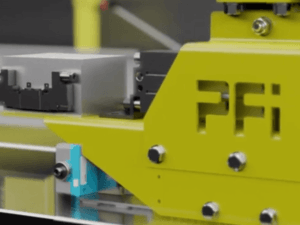Adam and Jim are back to tell us more about the manufacturing industry in Australia and what makes Products For Industry successful.
They share 7 tips to succeed in building a long-lasting relationship with clients, leading a team and managing projects that you can adopt no matter what industry you’re in.
About PFI

Adam: Gavin started PFI around 15 years ago. The Australian standards came in with workplace safety in the early 2000s. Gavin worked in Victoria, which has always been ahead of the game even in fashion, infrastructure, and the arts of the city. The Australian standards were going in, but Gavin saw that they weren’t being adopted in Queensland yet.
Gavin left his job, drove up with the trailer, and brought all of the safety equipment and safety systems to Queensland. He bought a little house in Inala, which was the industrial hub, especially at the time when he came to Brisbane.
When you go see clients who have been in Brisbane for 25 years, they go “I remember Gavin walking in here with a suitcase in a trailer and you’d walk up into the back of his trailer, and he’d show you safety curtains and other things.”
Get a fresh pair of eyes to look at your business and see where it’s best to optimize and automate.
5 Small Business Tips and Advice From PFI
1. Have Long-Term Clients
Adam: Gavin could write electrical schematic drawings better than a sparky, so he would write all of the safety systems and sell them to clients like James Hardie, which was one of our first clients.
We’re relationship-focused. We’re not trying to make an immediate buck out of anyone. We’re trying to make a relationship because the relationship is what takes our business into the next 20 years.
But we’re also in an industry where it’s not a repeat sale. I’m not selling you a beer now and you’re going to come back to buy another six next week because you liked it. We sell you one turnkey system, and that should last you for the next 25 years.
Jim: We build a relationship. A lot of our clients call us first when they have a breakdown, they want something or they have an idea and want to improve something. We have to come up with solutions for our clients daily, and we put a lot of effort into building that relationship with the client and playing the long game. It’s not about that quick kill.
Adam: We also try to steer away from having just a single point of contact with the client. We’ve got a client, a local poultry manufacturer in Brisbane, and they have seven points of contact at PFI.
We want to partner with people whom we can help grow as we grow. We help them with what we learn, and they help us with what they learn. That’s why PFI started five years ago with 70 staff, and now there are nearly 250.
2. Grow Your Business
Adam: Gavin started off as a salesman with a trailer selling safety systems and then got Matt Sullivan, who’s the first employee and still with the business. Then he bought an engineering company because he wants fabrication work and just kept growing the capabilities of the company.
Now the business ranges from sheet metal fabrication and stainless fabrication to heavy industrial. We cover our clients from every tier, and this is what separates us from the market. If we’ll do a project for you, we’ll do everything in-house—installation, electrical, mechanical, programming, design, etc. That puts it all on us, but we would prefer all of the risk to be on us because when dealing with third parties, you can’t guarantee the outcome.
We are client-focused, solution-focused. I have an incredible team of PMs who are there to take the client’s problems away. Clients engage us to come up with a resolution beyond what they’re capable of or know today and to have the best practice and whatever the best potential for the money that they’re willing to spend or at the level of process that they’re wanting to get to.
We need to find a happy medium. We don’t need to get the highest purchase order or get the most value out of that job. We need to value add to them at the maximum we can in any transaction. Don’t forget about the client; they dictate what that need is.
Often, I see people buying things that weren’t really required. You can sell these systems, like laser cutters, to small-medium enterprises and say this is revolutionary, but what if they don’t have the capacity that would warrant that?
We’re succeeding as a business because we are focusing on supporting our clients. We are providing solutions that they need, not what they don’t need. Unfortunately, some small and medium enterprise businesses will have a great salesman walk in the door and say, “You need this machine. There’s a technology grant you can get for it, so let’s go grab that 50K.”
Turn IT into a utility! Book a free 60-minute consultation with us.
3. Economy-Proof Your Business
Adam: We’re in a different market in that not everything is always up, and we have to be realistic about that.
You need to economy-proof yourself. COVID is a prime example. When building and construction went down or lockdowns happen, the manufacturing industry went up—toilet paper rolls are going off the shelf, chocolate going off the shelf.
Our strategy is diversifying our risk. When you have 250 people to consider, you have to set up your business to accommodate all of those opportunities.
Luckily, we work for a guy who is opportunity-focused. If there’s an opportunity and it’s of a sound reason, we want to be involved in it. Other people go, “We’ve got enough work for the year. We’ll keep the stable numbers.” But at PFI, we service different markets, different industries, different areas, and people at different levels so when construction is down, manufacturing is up. When manufacturing slows down, there are a lot of construction grants behind the government.
Jim: We’re a Swiss army knife, but we’re still sticking to the lane that we know. For instance, our clients might want a conveyor one day and then want electrical the next day. We have the ability to service them on all of those levels, and then they only have to deal with one contractor.
Automate your processes and have more time to work on your business.
4. Help Your Team Grow as Your Business Grows
Adam: Another point that is often missed when talking about narrowing down on one field of vision or one market area is staff retention. It’s a big thing for us.
If you don’t create an opportunity for people to grow, it’s hard to retain. If you keep doing the same thing, it becomes monotonous.
We feel we have to do set up the business to accommodate all opportunities because we’re not a hierarchical company. I like to describe PFI as a spherical company because as the ball or sphere gets bigger, the gaps between myself as a manager and my fellow managers become bigger, so we have to put someone in between us.
For example, if Jimmy’s got a promotion, he’s now in an area that he hasn’t dealt with before, so now he’s intrigued again. That is a big thing.
People coming to work is one thing. People coming to work and wanting to give 150% or working 10 hours but getting paid for 8. They don’t do that because they have to do it. They do it because they want to do it.
Adam: You must give them progression in their careers or train them. At PFI, The younger guys are on site, so they have their experiences up. We don’t want to lose the older guys who are not very able but still very valuable to our company so they work in the boiler making shop. They’ve got gantry cranes to assist them and aid them to do their job. They’re a wealth of knowledge, so we have to find a spot in our business that suits them, suits us, and overall, everyone is happy.
Make Promotions About Growth
Adam: We don’t promote anyone to put them above anyone. Someone is promoted to a manager role because we need to support more. Jim can stay in the same job title he’s in and get promoted seven times. He will just grow because he runs his own little business inside our business.
At the same time, we don’t promote progression for management. I came from a company where the supervisor had to die for his role to be replaced. For you to progress, someone had to fall off the perch. We don’t want that. We want guys to always be progressing. Obviously, there needs to be somebody governing and directing the fleet.
Now, Jimmy doesn’t need to be promoted. He doesn’t need a title to prove his worth. He went from whatever turnover he was doing last year to the turnover he’s doing this year, and he’s smashing it every week, and so is every other PM.
Naturally, we’re all competitive but we don’t compare numbers. It’s not about that. It’s about how well you did better this week than you did last week and how you’re performing.
As a sales manager, I do a lot of the relationship stuff, but I try not to be a part of the race because I need to be the coach. That’s the role that’s needed.
Get guaranteed uptime or get your money back. Sign up today!
Support and Motivate Your People
Jim: When I became a project manager at PFI, I always felt that I had the full backing of the company. As a project manager, you can make this job your own, go out, and build your own client base however you want to find them. Nobody is saying, “We’re in manufacturing or we’re an engineering company. Don’t do that.”
Adam: I don’t need to go over to Jim and say, you need to improve on this. Jim has higher standards for himself than I could ever put on him, and that’s one thing I’m very grateful for with all of our team. I don’t need to manage their performance or anything because they’re setting their own bar so much higher.
Jim: And when I’m there to support our lead installer on site, I tell him what we need to do but I don’t have to tell him how to do it because he’s a much better tradesman than I ever was. I get there, do all the paperwork, do all the client-facing stuff, get them the right gear, get the right parts, and set them going until I feel like I’m on his way—that’s the time for me to get out of there.
It’s like I’m on the bus and it’s my job to get the right people in the right seats. I don’t even have to drive the bus. I just have to find the best bus driver.
Adam: It’s a conductor in an orchestra. You’ve got all these subcontractors, our guys, engineers, the whole lot. Jim’s role is to time it beautifully, to get the engineer to do the design on time for it to roll into the next sequence and get to the crescendo.
Adam: No matter what level they are in the business, you treat them with the respect that they deserve and they go tenfold back for you. You trust these guys so much and they actually want to perform for you. It’s in people’s nature to want to perform, but we find those people and we give them the environment and the tools.
There are two ways to do it. You can whip people to get them to move forward, or you can motivate them by leading in front.
Motivation makes me happy every day. I love talking to people about the incredible things they’ve done in a day, the jobs that they’ve won, how well they’re executing a project, and what you want to be—instead of nailing them for everything that they made a mistake on. They know that and you don’t need to tell them or remind them.
We’ve had guys coming in with severe depression but have gone completely out of it because of the motivation to achieve something. They’ve got something to work towards. They’re supported by people. It’s a great thing to keep moving forward.
Get the technology your business needs for less. Join the Dollar IT Club!
5. Build a Team of Unicorns
Jim: If people are keen but they don’t want to be on-site, for instance, they can go into the shop. If they want to get out there and take the bull by the horns, there’s an opportunity for them, too.
Adam: You got to lean on the capability and knowledge of what you have. You can’t talk about what you’d like to have. We got to be realistic about this capability we have and maximise that.
We get unrealistic timelines in nearly every single job that we do. We don’t always get it right. But at the end of the day, all of us will go to the pub, have a beer and just laugh together. If you don’t laugh, you cry. And if it’s not fun, why would you give more than you need to? It’s got to be fun, and you have to create that environment.
Opportunities at PFI
PFI employs locally to try and change the future. If you know someone who has what it takes, jump across to PFI.
If you’re a business out there and you’re looking for some bespoke local manufacturing solutions, contact Adam or Jim.































